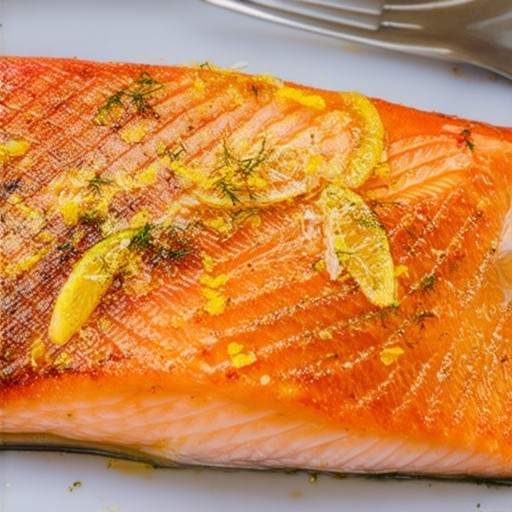Fresh fish fillets paired with lemon zest have long been celebrated as a culinary masterpiece, offering a vibrant blend of tangy brightness and delicate flavor. This timeless combination has captivated food enthusiasts worldwide, making it a staple in kitchens and restaurant menus alike. Whether you’re preparing a simple weeknight meal or aiming for a gourmet dining experience, incorporating lemon zest into your fish dishes can elevate both taste and presentation. From enhancing the natural sweetness of the fish to adding a refreshing zing, lemon zest transforms ordinary meals into extraordinary ones. Discover the secrets behind this beloved pairing, explore versatile cooking methods, and learn how to achieve the perfect balance of flavors in your next seafood dish.
Key Takeaways
– Flavor Enhancement: Lemon adds brightness and balance to fish, enhancing its taste and making it more palatable.
– Marinating Benefits: Using lemon juice tenderizes fish and adds moisture, while lemon zest enhances visual appeal.
– Cultural Tradition: Lemon is a traditional companion to seafood, reflecting its culinary versatility.
– Optimal Timing: For best results, add lemon zest after cooking to preserve texture and maximize flavor without overpowering the dish.
– Healthier Choice: Lemon zest retains more nutrients than fresh juice, making it a healthier addition to your meals.

Do fish and lemon go well together?
Fish and lemon are a classic pairing that works beautifully, offering a bright, tangy flavor that complements the natural taste of many seafood varieties. The acidity in lemon juice perfectly balances the richness of fish, enhancing the dining experience while adding a refreshing zest. Here’s a breakdown of why this pairing is so delightful:
Why Fish and Lemon Are a Great Combination
- Acidity Balance : Lemon’s acidic properties help cut through the fatiness of fish, making each bite more flavorful.
- Flavor Enhancement : The citrus notes in lemon juice bring out the subtle nuances in fish, intensifying the overall taste.
- Versatility : Lemon works well with a wide range of fish, from mild white fish like cod and tilapia to richer varieties like salmon and mackerel.
Popular Fish That Pair Well with Lemon
- Salmon : The fatty acids in salmon pair wonderfully with lemon, creating a harmonious balance between richness and brightness.
- Trout : Its delicate flavor is amplified by the zesty acidity of lemon, making it a perfect match for both simple and elaborate dishes.
- Mackerel : Known for its robust flavor, mackerel loves the sharpness of lemon, especially in dishes like smoked mackerel.
Recipe Ideas
For a quick and delicious meal, try sautéing your favorite fish in a bit of butter, then adding lemon juice to create a flavorful sauce. You can also use lemon zest as a finishing touch for a burst of freshness.
Tips for Success
- Season Wisely : Use a pinch of salt and pepper before adding lemon juice to prevent overpowering the dish.
- Serve Fresh : Ensure your lemon is juicy and fresh for the best flavor impact.
- Pair with Herbs : Complement your dish with herbs like dill, parsley, or thyme to elevate the taste further.
This versatile pairing is a staple in many cuisines worldwide, making it a go-to choice for seafood lovers seeking a bright and zesty dining experience.
How Lemon Enhances Fish Cooking
Lemon plays a crucial role in enhancing the flavor and texture of fish when cooking. Its acidic properties interact with fish proteins, helping to tenderize the meat and bring out its natural flavors.
Acidic Properties
The citric acid in lemon juice acts as a natural tenderizer, breaking down proteins and making the fish more succulent. This process also enhances the overall taste, providing a bright, refreshing note to the dish.
Flavor Enhancement
Lemon juice and zest add a citrusy brightness to fish dishes, balancing and uplifting other flavors present, such as herbs and spices. This balance is particularly effective in dishes like grilled salmon or baked cod.
Usage Timing
Whether you use lemon juice before or after cooking depends on your preference and the cooking method. Marinating fish in lemon juice beforehand allows flavors to infuse deeper, while adding lemon juice during or after cooking preserves more of its vitamin C content, which may otherwise be lost with prolonged exposure to heat.
Nutritional Benefits
Lemon contributes vitamins and antioxidants, notably vitamin C, which supports immune function and may help combat oxidative stress. Including lemon in fish dishes adds nutritional value alongside culinary enhancement.
Cooking Method Considerations
For grilling, a lemon-based marinade combining olive oil, garlic, and herbs is ideal. Baking might involve drizzling lemon juice over the fish during the last few minutes of cooking to prevent it from drying out. Sautéing can incorporate lemon zest for a finishing touch.
Fish Type Influence
Different fish benefit differently from lemon. Fatty fish like salmon thrive with lemon’s acidity, which cuts through richness. Lean fish may appreciate lemon’s ability to add moisture and brightness.
Presentation and Aesthetic Appeal
Slices of lemon on top of fish dishes not only enhance flavor but also elevate presentation, making meals more visually appealing and inviting.
Conclusion
In summary, lemon is a versatile and valuable ingredient in fish cooking, offering both flavor enhancement and health benefits. Its use can be tailored to various cooking methods and fish types to achieve optimal results.

Why Do You Soak Fish Fillets in Milk?
Soaking fish fillets in milk serves several purposes, each contributing to a more tender and flavorful dish:
- Moisture Absorption: Fish fillets may contain excess moisture, which can affect their texture. Milk helps absorb this moisture, ensuring a drier fillet.
- Reducing Saltiness: Frozen or previously frozen fish can sometimes retain saltiness. Soaking in milk helps diminish this, making the dish less salty.
- Tenderizing the Flesh: The enzymes in milk can break down connective tissues, resulting in a flakier and more tender fish texture.
- Enhancing Flavor: By soaking the fish in milk before seasoning, the flavors of your chosen spices or herbs can better penetrate the fillet, boosting overall taste.
While some may dislike the milky texture, many chefs advocate for this method, suggesting variations like using buttermilk for added tanginess. Ultimately, the decision to soak fish in milk is a matter of personal preference, with the benefits often outweighing any drawbacks for many cooks.

Why Do Restaurants Serve Lemon with Fish?
Restaurants often serve lemon with fish for several reasons, each contributing to a balanced and enhanced dining experience:
- Flavor Enhancement : Lemon juice adds a bright acidity that balances the richness of fish, making it more palatable. Its tartness helps reduce the intensity of fishy flavors, creating a more harmonious taste profile.
- Marinade and Tenderization : Lemon juice can act as part of a marinade, helping to tenderize the fish and add moisture. Its acidic properties break down proteins, resulting in a softer and more flavorful texture.
- Flavor Brightness : The citrus notes from lemon juice introduce a refreshing brightness to the dish, complementing the natural flavors of the fish and preventing the overall meal from feeling overly heavy.
- Cultural Influence : In many culinary traditions, particularly Mediterranean and Italian, lemon is a common companion to seafood. This practice has evolved over time based on the proven compatibility of lemon’s acidity with fish.
- Aesthetic Appeal : Lemon zest or juice can elevate the visual appeal of a dish, adding a fresh, colorful garnish that enhances the presentation and gives the plate a gourmet touch.
These factors collectively contribute to a more enjoyable and balanced dining experience, making lemon a versatile and popular addition to fish dishes.
What Is It Called When You Use Lemon to Cook Fish?
When you use lemon to cook fish, it’s often referred to as marinating. Marinating fish in lemon juice or another acidic ingredient helps tenderize the meat and adds flavor. The acid in lemon juice reacts with the proteins in the fish, making it more firm and flavorful while preserving its freshness.
The process involves:
- Prepping the fish by removing bones and skin (if necessary)
- Mixing lemon juice with other seasonings or herbs
- Soaking the fish in the lemon mixture for several minutes
- Cooking the fish according to your preferred method
This technique is popular in dishes like ceviche, where fresh seafood is marinated in citrus juices. For a simple and delicious recipe, check out our Lemon Fish Marination Recipe on Only Fish Recipes.

When to Add Lemon to Fish: Before or After Cooking?
Whether to add lemon to fish before or after cooking has been a subject of debate among food enthusiasts. Here’s a structured approach to determine the optimal timing:
- Before Cooking: – Applying lemon juice or zest before cooking can enhance the flavor of the dish. – However, marinating fish in lemon juice may lead to a softer texture due to protein breakdown caused by the acid. – Opt for lemon zest over fresh juice to reduce enzymatic activity and retain texture.
- After Cooking: – Adding lemon zest or a squeeze of lemon juice after cooking preserves the fish’s texture and enhances flavor without overcooking. – Fresh lemon juice loses some vitamin C when cooked, making it less nutritious if consumed post-cooking. – Consider using lemon zest for a milder, aromatic touch that complements the fish without overwhelming it.
- Health Considerations: – Vitamin C benefits are preserved if lemon is added after cooking. – Lemon zest is a healthier option compared to fresh juice, as it retains more nutrients.
- Personal Preference: – Taste preferences vary; some enjoy the bright citrus notes, while others prefer a subtler flavor.
- Conclusion: – For optimal texture and flavor balance, apply lemon after cooking, using zest for a delicate enhancement. – This approach maximizes the fish’s natural taste while preserving its texture and nutritional value.




0 Comments